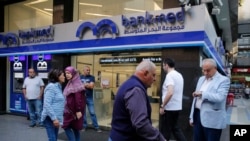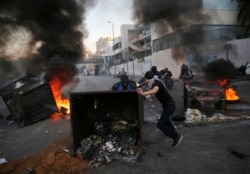Lebanon's central bank, seeking to shore up battered confidence in the financial system amid the worst economic crisis in decades, said on Monday bank deposits are secure and it had the ability to preserve the stability of the pegged Lebanese pound.
In a televised news conference, governor, Riad Salameh, said capital controls were not on the table because Lebanon depended on free movement of money, adding that the central bank had taken steps to safeguard deposits and there would be no haircut.
Already in deep economic turmoil, Lebanon has been plunged deeper into trouble since Oct. 17 when an unprecedented wave of protests against the ruling elite erupted across the country and prompted the resignation of Prime Minister Saad al-Hariri.
Lebanon is in urgent need of a new government to enact emergency economic measures. The head of the powerful, Iran-backed Shi'ite group Hezbollah, said he wanted to avoid public discussion of closed-door talks over the new government, saying he wanted to leave the door open for an agreement.
Three senior sources told Reuters on Sunday the talks were still deadlocked.
A big part of Lebanon's economic crisis stems from a slowdown of capital inflows which has led to a scarcity of U.S. dollars and spawned a black market where the Lebanese pound has weakened below its official pegged rate.
Since reopening on Nov. 1 after a two-week closure, banks have been seeking to stave off capital flight by blocking most transfers abroad and imposing curbs on hard-currency withdrawals.
Referring to these restrictions, Salameh said the central bank had asked banks to review what he described as somewhat "conservative" steps taken because of instability that was prevailing at the time banks had reopened.
Salameh said the banks would meet immediately to review and implement the central bank's request. He said that banks managing their liquidity did "not mean the solvency of the banking sector was reduced or poses dangers to deposits."
Salameh said the central bank was allowing banks to borrow dollars without limits at 20 percent interest to secure depositors' needs on condition such funds were not sent abroad.
"The mechanism we put in place to protect the depositor is through preventing any bank from failing," he said.
In a further potential disruption to bank operations, a union representing bank staff urged them to strike, starting on Tuesday, because of security concerns stemming from protests at banks and depositors demanding withdrawal of their funds.
Stagnant local economy
Salameh said the central bank hoped for the formation of a new government as soon as possible. The central bank would seek to lower interest rates through liquidity management, he added.
"We are today in a new phase," Salameh said. "We will preserve the stability of the exchange rate of the pound, this stability is present," he said, noting that banks were still dealing dollars at the official pegged rate.
The difference between the official rate and that on the parallel market was due to "supply and demand", he said. The central bank would not go to exchange dealers to give them dollars to preserve the official rate, he said.
This "phenonmeon" would retreat when there is more "relief" in the situation, he said.
Salameh said a round of so-called "financial engineering" in July had led to a $2 billion increase in its reserves, but the "exceptional circumstances" in Lebanon today did not allow for financial engineering and instead required liquidity management.
One dollar bought 1,800 pounds or more on Friday compared to 1,740 on Thursday, two market sources said. The pegged rate is 1,507.5 pounds. Banks on Monday were closed for a holiday.
Salameh said the central bank had a usable foreign cash reserve of $30 billion and total assets of $38 billion.
A stagnant local economy and a slowdown in cash injections from Lebanese abroad have put pressure on the central bank's foreign currency reserves in recent years. Recent months have seen the emergence of a parallel exchange market for dollars.
The build-up of economic and political pressure has made dollars harder to come by and weakened the pound against the dollar on the parallel exchange market with a discount to the official two-decade old peg around 20%.
Hezbollah leader Hassan Nasrallah said fighting corruption in Lebanon must be through the judicial system. He called on judges to bring forward corruption cases including against state officials, even if they were Hezbollah officials.
He also accused Washington of seeking to deepen Lebanon's economic woes, including through sanctions and preventing Chinese, Iranian and other firms from investing in Lebanon.






